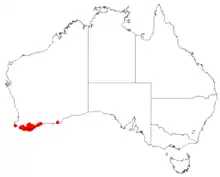Hakea florida
Hakea florida is a shrub in the family Proteacea. It is endemic to an area along the south coast in the South West, Great Southern and Goldfields-Esperance regions of Western Australia.[2]
| Hakea florida | |
|---|---|
 | |
| Hakea florida in the ANBG | |
| Scientific classification | |
| Kingdom: | Plantae |
| Clade: | Tracheophytes |
| Clade: | Angiosperms |
| Clade: | Eudicots |
| Order: | Proteales |
| Family: | Proteaceae |
| Genus: | Hakea |
| Species: | H. florida |
| Binomial name | |
| Hakea florida | |
 | |
| Occurrence data from AVH | |
Description
The erect, prickly, bushy shrub typically grows to a height of 0.9 to 2.5 metres (3.0 to 8.2 ft) with smooth soft grey bark. Profuse blooms appear from October to January and produces strongly scented white-cream flowers in the leaf axils. The sharp pointed leaves are sparse, widely spaced, thick and linear-lanceolate with a central vein. The warty fruit are large and rounded up to 2–3 cm (0.8–1 in) long and 2.5 cm (1 in) wide, ending in two distinct horns. A very showy shrub in full bloom.[3][4]
Taxonomy and naming
Hakea florida was first formally described in 1810 by Robert Brown and the description was published in Transactions of the Linnean Society of London.[5][6] It is named from the Latin fluorides-many flowered, referring to the profuse showy flowers.[2][3]
Distribution and habitat
Occurs from Manjimup south coast to Denmark east to the Fitzgerald River National Park.[4] Hakea florida grows on sand, loam, clayey sand, gravel, laterite and granite. May be grown in sun or semi-shade, it is frost and drought tolerant.[2][3]
Conservation status
Hakea florida is classified as "not threatened" by the Western Australian Government.[2]
References
- "Hakea florida". Australian Plant Census. Retrieved 9 April 2020.
- "Hakea florida". FloraBase. Western Australian Government Department of Parks and Wildlife.
- Young, J A. Hakeas of Western Australia:A Field and Identification Guide. J A Young. ISBN 0-9585778-2-X.
- Holliday, Ivan (2005). Hakeas: A Field and Garden Guide. Reed New Holland. ISBN 1-877069-14-0.
- "Hakea florida". Australian Plant Name Index. Retrieved 9 April 2020.
- "Transactions of the Linnean Society of London". Biodiversity Heritage Library. Retrieved 9 April 2020.
| Taxon identifiers |
|---|